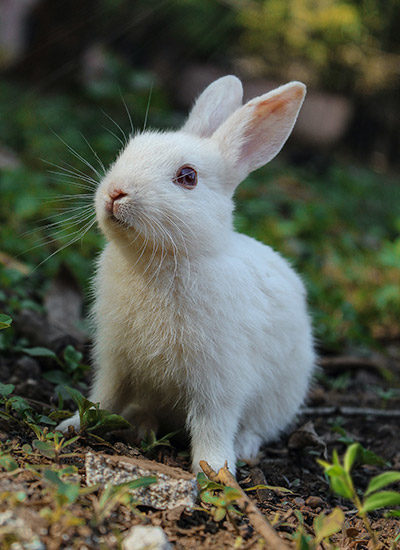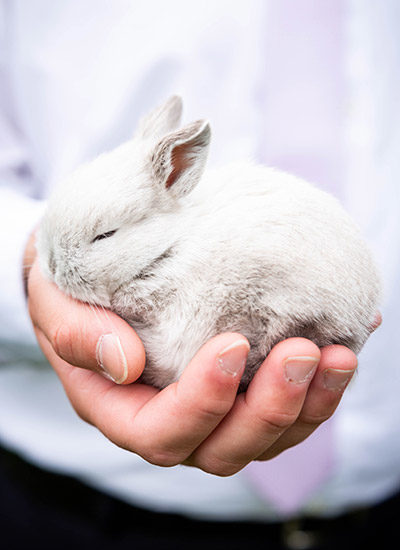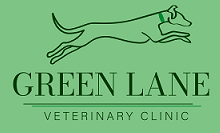Caring for your rabbits

Rabbits can make very good pets, but they have some important husbandry needs that must be addressed in order to provide adequately for their health and welfare. As well as social interaction with other rabbits, they also enjoy being friendly with humans too. They need to be given attention every day and require regular gentle handling to establish and maintain that human:rabbit social bond, although this must be on their terms. The daily contact also allows an opportunity to check them for any health problems.
All pet owners have a responsibility to provide suitable care for their pets, and this is outlined in the Animal Welfare Act 2006. However, you can find some examples of such requirements for rabbits below:
- A suitable environment. A hutch on its own is not enough! They should have a secure, well insulated and ventilated hutch providing plenty of room to move around and stretch out, ideally a minimum size of 6ft long by 2ft wide and 2ft high or with enough space to fully stand up in, whichever is the smaller. This provides a sheltered space for rabbits to use as their base, and they should ideally have constant access to a grass run area which is a minimum size of 8 feet by 4 feet, alternatively a minimum access of 4 hours per day. Indoor rabbits need the same space allocation and may be enclosed within a pen or run, alternatively they may have free run of a room as space to run around helps to provide exercise.
- A suitable diet. Rabbits are strict herbivores and spend a lot of time eating. It is best to give them a diet consisting mainly of hay, fresh, or dried grasses (approximately 85%). Approximately 10% of the diet may be made up of green leafy vegetation, and approximately 5% (about an egg cup full for an average sized 2.5kg rabbit) of good quality extruded pelleted concentrate food. The ideal is to ensure ad-lib, or unlimited, good quality hay, plus these other components. Water should be provided at all times, via a water bottle, clean bowl, or both.
- To exhibit normal behaviour. To do this, they require adequate space, opportunities to run, jump, dig and forage. Try to make their environment interesting with tubes, hides, cardboard boxes, and objects to stand on and look around. Beware that rabbits burrow so an outdoor run area should have buried wire sides, or be checked or moved frequently. Neutered rabbits are less prone to digging deep burrows, but, being part of their normal behaviour, digging should be accommodated, even indoors. Trays or earth, shavings, hay, cardboard chips etc provide good digging boxes.
- Interaction with other rabbits, in compatible pairings or small
 groups. Rabbits are social animals, and solitary confinement is unnatural to them. To avoid rabbits breeding like, well, rabbits, and to prevent potentially fatal uterine cancer in the females, both sexes should be neutered.
groups. Rabbits are social animals, and solitary confinement is unnatural to them. To avoid rabbits breeding like, well, rabbits, and to prevent potentially fatal uterine cancer in the females, both sexes should be neutered. - To be protected from pain, injury or disease. This means that they should be vaccinated, treated for any parasites as directed by your veterinary surgeon, and regularly (daily), checked for any signs of ill health by their owners. Regularly checking the teeth, ears, skin, claws and underside, around the back end, in particular, are vital.There are several signs that your rabbit may be ill and require veterinary attention. Among these are:– Loss of appetite
– Weight loss
– Looking depressed
– Skin trouble
– Runny faeces and/or urine soaking into the back legs
– Discharges from the nose, eyes or mouth
– Difficulty breathing




